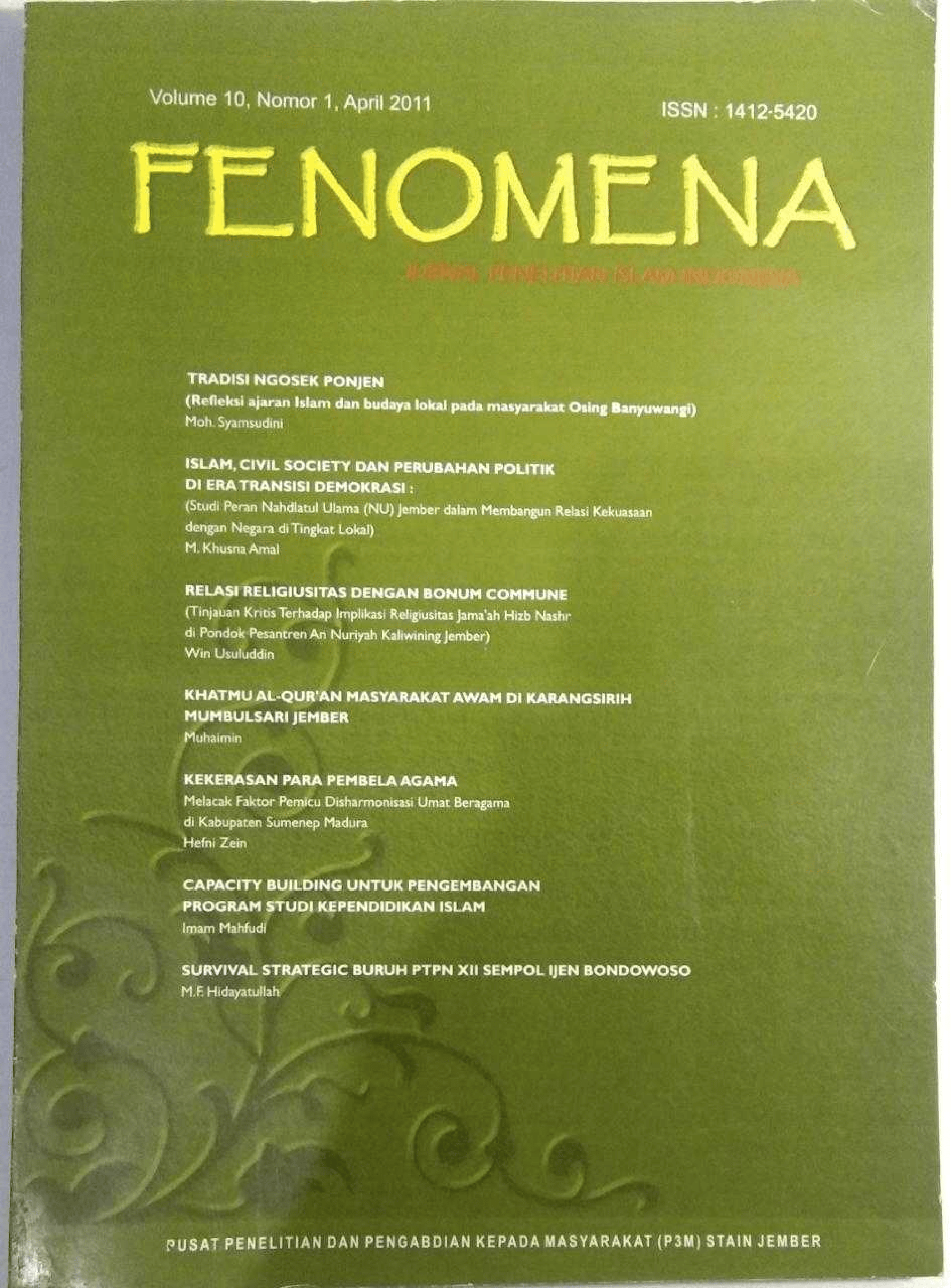Peningkatan Kualitas Layanan Perawat Melalui Metode Pelatihan
Improving Nurse Service Quality Through Training Methods
DOI:
https://doi.org/10.35719/fenomena.v10i1.496Keywords:
Service quality, Nurses, Training, Kualitas layanan, Perawat, PelatihanAbstract
Service quality plays a crucial role in customer satisfaction. This research aims to enhance the service quality of nurses through training methods. The study design employs an untreated control group design with pretest and posttest. The experimental group consisted of 9 junior nurses, while the control group comprised 10 junior nurses. The experimental group received training on service quality, whereas the control group did not. Nurses' service quality was measured using observation rating scale sheets, with an interrater reliability coefficient of 0.77. Non-parametric Mann-Whitney U test was used for data analysis. Hypothesis testing revealed no significant differences in service quality between the experimental and control groups.
Kualitas layanan memiliki peran penting dalam kepuasan pelanggan. Penelitian ini bertujuan untuk meningkatkan kualitas layanan perawat melalui metode pelatihan. Desain penelitian menggunakan untreated control group design dengan pretest dan posttest. Kelompok eksperimen terdiri dari 9 perawat junior, sedangkan kelompok kontrol terdiri dari 10 perawat junior. Kelompok eksperimen dilatih tentang kualitas layanan, sementara kelompok kontrol tidak diberikan pelatihan. Kualitas layanan perawat diukur menggunakan lembar observasi rating scale. Koefisien reliabilitas antar-pengamat adalah 0,77. Data dianalisis menggunakan uji non-parametrik Mann-Whitney U. Hasil pengujian hipotesis menunjukkan tidak ada perbedaan signifikan dalam kualitas layanan antara kelompok eksperimen dan kelompok kontrol.
Downloads
References
Azwar, S. (2006). Reliabilitas dan Validitas. Yogyakarta: Pustaka Pelajar.
Cook, T. D., & Campbell, D. T. (1979). Quasi Experiment: Design and Analysis Issues For Field Settings. Boston: Houghton Mifflin Company.
Diekhoff, G. (1992). Statistic For The Social and Behavioral Sciences, Univariate Bivariate Multivariate. Dubuque: Wm C. Brown Publishers.
Fallowfield, L., Jenkins, V., Farewell, V., Saul, J., Duffy, A., & Eves, R. (2002). Efficacy of A Cancer Research UK Communication Skills Training Model For Oncologists: A randomized Controlled Trial. Lancet Journal, 359, 650-656.
Irwin, D. M., & Bushnell, M. M. (1980). Observational Strategies For Child Study. New York: Holt, Rinehart and Winston.
Kerlinger, F. N., & Lee, H. B. (2000). Foundations Of Behavioral Research (4th ed.). Orlando: Harcourt College Publishers.
Kotler, P., & Armstrong, G. (1994). Principles Of Marketing. New Jersey: Prentice-Hall International.
Latipun. (2002). Psikologi Eksperimen. Malang: Universitas Muhammadiyah Malang.
Lindberg, L., & Kimberlain, J. (2008). Engage Employees To Improve Staff And Patient Satisfaction. Journal of Hospitals and Health Networks, 82, 28-29.
Mayer, T. A., Cates, R. J., Mastorovich, M. J., & Royalty, D. L. (1998). Emergency Department Patient Satisfaction: Customer Service Training Improves Patient Satisfaction And Ratings Of Physician And Nurse Skill. Journal of Healthcare Management, 43, 427-440.
Myers, A., & Hansen, C. H. (2002). Experimental Psychology (5th ed.). Pacific Groves: Wadsworth.
Noe, R. A. (2000). Employee Training And Development. Singapore: McGraw-Hill.
Parasuraman, A., Zeithaml, V. A., & Berry, L. L. (1988). SERVQUAL: A multiple-item scale for measuring consumer perceptions of service quality. Journal of Retailing, 64, 12-40.
Reynolds, W. J., & Scott, B. (2000). Do Nurses And Other Professional Helpers Normally Display Much Empathy? Journal of Advanced Nursing, 31, 226-234.
Sugiarto, E. (2002). Psikologi Pelayanan Dalam Industri Jasa. Jakarta: Gramedia Pustaka Utama.
Susskind, A. M., Borchgrevink, C. P., & Kacmar, K. M. (2003). Customer Service Providers’ Attitudes: Relating To Customer Service And Customer Satisfaction In The Customer-Server Exchange. Journal of Applied Psychology, 88, 179-187.
Tsai, W. C., & Huang, Y. M. (2002). Mechanisms Linking Employee Affective Delivery And Customer Behavioral Intentions. Journal of Applied Psychology, 87, 1001-1008.
Wilkinson, S. M., Leliopoulou, C., Gambles, M., & Roberts, A. (2003). Can Intensive Three-Day Programmes Improve Nurses’ Communication Skills In Cancer Care? *Journal of Psycho-Oncology, 12*, 747-759.
Zeithaml, V. A., & Bitner, M. J. (1996). Services Marketing. New York: McGraw-Hill.
Downloads
Published
Issue
Section
License
Copyright (c) 2011 Yunma Yunma

This work is licensed under a Creative Commons Attribution-NonCommercial 4.0 International License.















